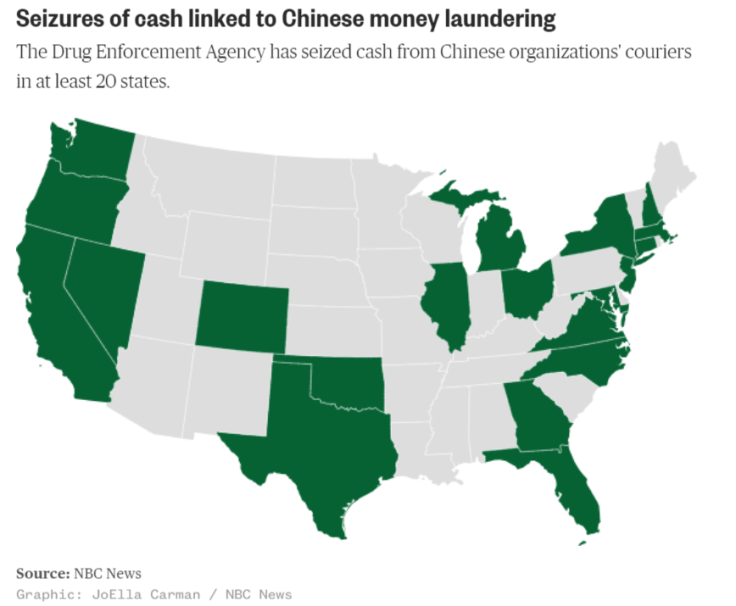
SEATTLE - Experts and former DEA agents are raising their concerns over the recent collaboration between Mexican and Chinese organized criminal groups, arguing that this could pose a potential national security threat to the United States.
Ray Donovan, a federal drug agent, found in 2015 that Chinese criminal groups were laundering drug money for the Mexican cartels on an unprecedented scale. With the help of investigators, he later found that the same Chinese brokers who were laundering fentanyl proceeds were now heavily involved in marijuana trafficking across the United States as well.
"It's two revenue streams that no one else can compete with," said Christopher Urben, a former assistant special agent in charge at the DEA's Special Operations Division in Virginia. "They've created within the United States, I hate to say it, this super cartel organized crime force."
More than half a dozen retired senior DEA agents said that, with U.S. law enforcement agencies focused on busting fentanyl traffickers and suppliers, Chinese money brokers and marijuana producers operated with relative impunity.
This scheme has exponentially increased the profits of the two Mexican cartels fueling the fentanyl crisis in the U.S. — the Sinaloa and CJNG. The vast amounts of funds involved also raises national security concerns, according to experts and U.S. lawmakers.
Since 2023, federal prosecutors have charged at least 31 people linked to Chinese groups accused of laundering cartel drug money but, according to the former DEA agents, thousands of Chinese money brokers are believed to be operating across the country.
"It's striking how rapidly that rise has taken place," said Vanda Felbab-Brown, a senior fellow at the Brookings Institution who studies Chinese organized crime.
How Chinese criminal groups launder money?
The process begins with Mexican cartel associates dropping off cash from fentanyl sales to Chinese money brokers in the U.S, where they arrange for the cartels to receive the equivalent amount in pesos or cryptocurrency in Mexico. By arranging sales of cash instead of transporting money across borders, Chinese launderers evade common methods of detection and provide their services faster and cheaper than other groups.
But what makes this sophisticated system so successful is its reliance on wealthy Chinese nationals looking to move money out of their home country. By using encrypted platforms and apps, they sell U.S. dollars at a steep markup to Chinese nationals.
The process often involves "mirror transactions," in which the Chinese customers pay for the U.S. dollars by transferring the equivalent amount from their bank account to local accounts controlled by the money laundering organization. "No one could compete with their money laundering scheme," said Urben, the DEA agent who was brought in to lead the effort.

Combating Chinese-run marijuana grows
According to the DEA, Chinese-run marijuana grows have been identified in 23 states, with Oklahoma emerging as one of the hotbeds of production due to its relaxed medical marijuana laws and vast tracts of affordable land.
Local and state authorities have shut down over 3,000 marijuana farms with an estimated 80% to 90% of them linked to Chinese organized crime rings, according to the state's Bureau of Narcotics.
The Chinese use the drug proceeds to fund other criminal activities, including human trafficking, the DEA Said in a May report.
More recently, Chinese marijuana producers have settled in Maine. Since January, more than 40 illegal grow operations with ties to Chinese organized crime have been shut down across the state. But nearly 100 likely remain up and running, according to federal authorities.
In June, 24 people were charged in a money laundering scheme involving the Sinaloa cartel who conspired with Chinese groups to cover up more than $50 million in drug profits, much of which was processed in the Los Angeles area, the prosecutors said.
© 2025 Latin Times. All rights reserved. Do not reproduce without permission.





